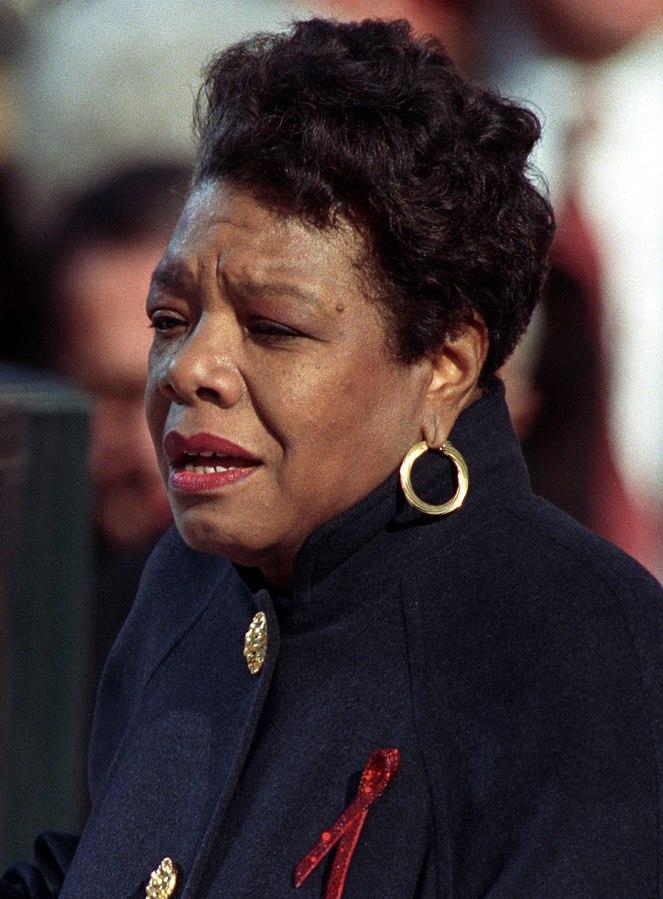Pictured is a photograph of Maya Angelou reciting her poem "On the Pulse of Morning" at President Bill Clinton's inauguration in 1993. As an African American woman, her inclusion symbolized progress and inclusivity in American politics. By inviting Angelou to deliver a poem at his inauguration, President Clinton acknowledged the contributions of African Americans and women to American society, fostering a sense of unity and representation.
Maya Angelou, through her evocative writing and powerful voice, became a beacon in the Civil Rights Movement. Her autobiographical works, notably "I Know Why the Caged Bird Sings," illuminated the struggles of African Americans, resonating deeply with readers worldwide. Angelou's poetry, speeches, and activism inspired generations, urging for racial equality and social justice. Her spirit and resilience not only amplified the voices of the marginalized but also challenged societal norms, fostering empathy and understanding. Angelou's influence continues to reverberate, reminding us of the enduring power of art and advocacy in shaping movements for equality and freedom.
Angelou’s poem “Still I Rise” states, “Bringing the gifts that my ancestors gave, I am the dream and the hope of the slave. I rise I rise I rise.” These words hold immense significance within the context of African American history and the ongoing struggle for equality. By referencing the gifts of her ancestors and proclaiming herself as the embodiment of their dreams and hopes, Angelou invokes the resilience and strength of generations of African Americans who endured slavery and oppression. To be a black woman speaking about the injustice that they face on a day-to-day basis is significant and groundbreaking. Angelou defined all odds that were placed upon her by white Americans, showing her strength and resilience in a much-needed time.
Womenshistory states, “In 1969, Angelou published I Know Why the Caged Bird Sings, an autobiography of her early life. Her tale of personal strength amid childhood trauma and racism resonated with readers and was nominated for the National Book Award.” The publication of "I Know Why the Caged Bird Sings" marked a significant moment in literary history and the Civil Rights Movement. Angelou's autobiography provided a portrayal of her early life, navigating through trauma and racism with resilience and courage. Its impact was profound, as it shed light on the experiences of African Americans, particularly women, in the face of systemic oppression.
In The Black Scholar’s interview with Angelou she states, “Endurance is one thing. I think endurance with output, endurance with productivity is the issue. If one has the fortune, good or bad, to stay alive one endures, but to continue to write the books and get them out- that's the pro- ductivity and I think that is important to link with the endurance.” Angelou emphasizes that while enduring life's challenges is one thing, true significance lies in the ability to maintain productivity despite adversity. For her, the act of writing and producing books is not only a testament to endurance but also a demonstration of resilience and determination.
Works Cited
Angelou, Maya. “THE BLACK SCHOLAR Interviews: MAYA ANGELOU.” The Black Scholar, vol. 8, no. 4, 1977, pp. 44–53. JSTOR, http://www.jstor.org/stable/41066104. Accessed 5 May 2024.
Angelou, Maya. “Still I Rise .” Poetry Foundation, Poetry Foundation, www.poetryfoundation.org/poems/46446/still-i-rise. Accessed 4 May 2024.
"Maya Angelou." Wikipedia, Wikimedia Foundation, 9 Apr. 2024, en.wikipedia.org/wiki/Maya_Angelou. Accessed 5 May 2024.
Spring, Kelly. “Maya Angelou." National Women's History Museum. National Women's History Museum, 2017. Accesses 4 May 2024.


